Hospitals and clinics are in a tough spot with mounting economic pressures and noticeable staff shortages. They must provide top-notch care without breaking the bank. Healthcare automation is an emergent tech solution that has become a hot trend.
Automation in healthcare is about more than adapting to trends. Industry leaders want to make healthcare faster, more accurate, and, most importantly, centered around patients’ needs. This shift towards digital transformation and data-driven decisions is a game-changer, helping to reduce mistakes, save time, and keep costs in check while dealing with today’s realities.
Fortunately, recent advancements in robotics, AI, and machine learning have changed the game for those in the industry. The promise of leveraging technology to automate cumbersome, manual, and error-prone tasks while providing quicker, more patient-centric care makes automation the cure we need in this challenging environment.
What Does Automation in Healthcare Mean?
Automation in healthcare refers to utilizing technology, software, robotics, or procedures to achieve goals with limited human involvement. It includes leveraging technologies like artificial intelligence, robotic process automation (RPA), and business process management (BPM) to enhance operational efficiency.
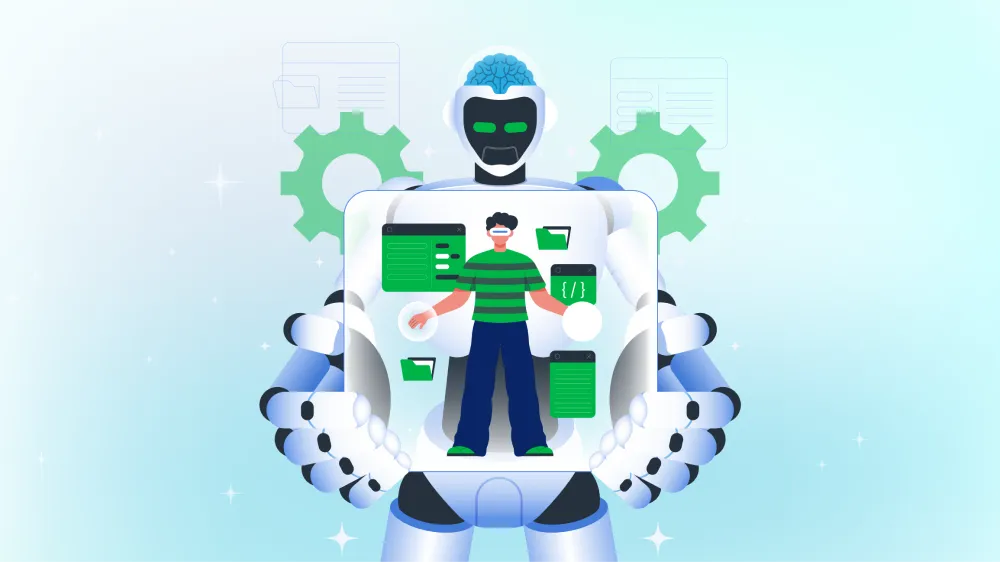
Healthcare facilities, professionals, and researchers leverage automation at different stages in their workflow to make the most of patient and operational data, using them to improve productivity and meet the increasing demands of healthcare workload.
Automation is the cornerstone of digital transformation and an essential linchpin in helping healthcare organizations scale.
How Automation is Revolutionizing Healthcare?
Today’s world runs on automation. From manufacturing to supply chain, automation is making its mark by creating incredible growth across various business operations. In healthcare, this groundbreaking technology also has significant potential to encompass every sector: providers, payers, pharmaceuticals, health systems, clinical research, and more.
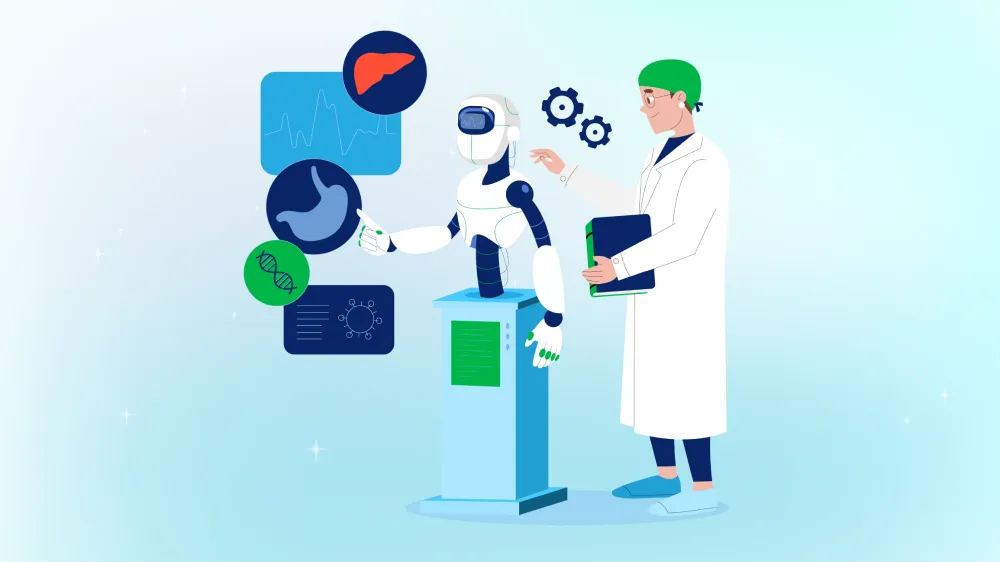
The power of automation lies in its ability to consolidate all essential elements for delivering optimal care, which gets fragmented across various systems and applications. In developed countries, automation reduces medical errors for higher patient safety. For example, 98.7% of US hospitals use barcode medication administration systems with electronic medication administration records. These systems ensure that patients receive the proper medication by having the clinician scan a barcode on a patient’s wristband before treatment.
In developing countries, automation plays a vital role in bridging disparities in access to healthcare. By allowing the remote monitoring of digital health data, automation can help address the common challenges that prevent patients from accessing quality healthcare: geographical barriers, insurance disparities, and the digital divide.
Some argue that healthcare needs to catch up to other industries in terms of automation, but this slower pace is by design. It’s vital to remember that too much reliance on automation can do more harm than good if patient safety isn’t handled carefully. Therefore, upcoming healthcare automation innovations must be tailored to this understanding and prioritize human well-being.
6 Key Advantages of Healthcare Automation
Automation-powered solutions are supporting healthcare headliners to overcome economic and workforce challenges, including:
- Streamline healthcare operations
- Lower operational costs
- Reduce staff burnout
- Enhance patient experience
- Ensure data privacy and compliance
- Improve data access and transfer
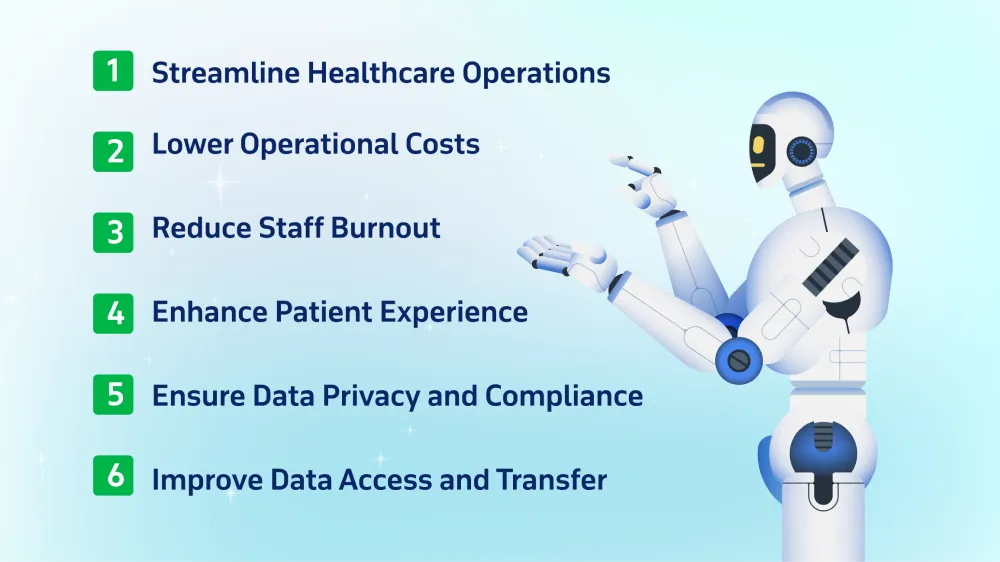
1. Streamline Healthcare Operations
Automation in healthcare helps streamline processes and enables your staff to operate with fewer obstacles. Implementing automation results in higher throughput, increased accuracy, and reduced errors and costs for your organization.
One upside to automation is that it allows your clinical staff to serve more patients, increasing the overall work capacity. Moreover, some AI-based automated systems help handle all manual and repetitive tasks, allowing healthcare professionals to focus more on patient-centric tasks.
2. Lower Operational Costs
Cutting costs is the main reason why healthcare leaders opt for automation solutions. By implementing automated workflow, your organization can significantly cut operational costs without disrupting clinical or administrative processes.
The standout benefit of automation is optimizing organizational resource utilization and promoting cost-effectiveness. Emergent tech like Robotic Process Automation (RPA) can help streamline complex processes, improve operational efficiency, and reduce the likelihood of costly errors.
3. Reduce Staff Burnout
92% of healthcare professionals believe that putting too much effort into administrative tasks is the main reason for medical work burnout. Implementing automation in healthcare can free staff from manual tasks and save significant effort and time.
Remember, automation won’t eliminate medical staff but will allow them to focus on their core mission and deliver patient care. Automation will help put staff in more advanced roles that make the most of their clinical skills, which they have been trained for.
4. Enhance Patient Experience
The key to it all is delivering the value to the end user – the patient. Automation aids patient care by streamlining treatment coordination, case management, and remote patient monitoring. It assists in monitoring patient progress, sending alerts, personalizing suggestions, and enhancing patient-provider communication.
Moreover, an automated system helps save time and empower patients to manage their well-being, with customized features to identify high-risk patients needing proactive interventions.
5. Ensure Data Privacy and Compliance
Every healthcare facility must adhere to industry-specific regulations, such as HIPAA (which safeguards personal health information). When handling patient data, it is crucial to encrypt it securely and how it is accessed. Adopting automation can add another layer of security by reducing human involvement and even helping monitor activity logs for digital files.
Without automation, patients’ documents will have to go through various departments for each stage of the care workflow, from appointment reminders to follow-up messages to prescriptions and billing. Automation can handle these communications based on encrypted patient records, and the wrong people wouldn’t repeatedly view those records and other sensitive information.
6. Improve Data Access and Transfer
The healthcare industry is grappling with challenges related to data sharing. Automation can help swiftly input patient data into the database, enabling seamless data sharing among departments and facilities. Therefore, healthcare professionals can access reliable, up-to-date patient data and provide more personalized patient care.
Notable Use Cases of Automation in Healthcare
As more healthcare companies implement automation technologies, we see several applications in this field. Some notable ones include:
- Appointment scheduling and reminders
- Patient check-in and discharge
- Prescription refill requests
- Data collection and analysis
- Revenue cycle management
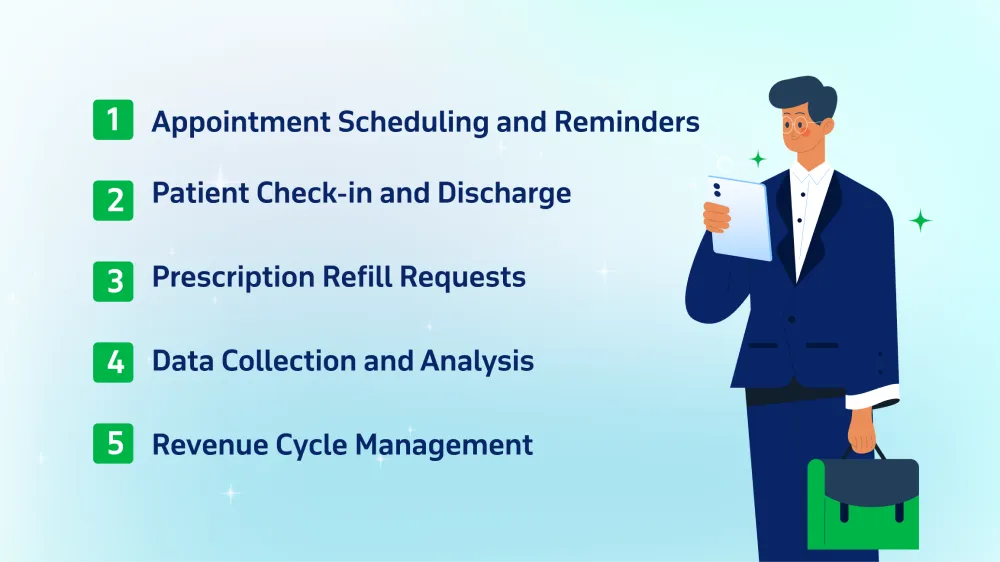
1. Appointment Scheduling and Reminders
Scheduling appointments manually can be challenging because of potential schedule conflicts and the various factors in aligning the patient with the appropriate provider.
Automating appointment booking lets patients quickly schedule appointments from any device and location. Patients can view available appointment slots for the weeks ahead, while healthcare facilities have complete control over scheduling rules. Another added benefit of automated scheduling is the ability to send patients reminders about their upcoming appointments, reducing no-shows or missed appointments.
2. Patient Check-in and Discharge
Patient registration and discharge require careful handling of patient health records, contact details, treatment history, insurance coverage, laboratory examinations, and other data. These steps are not only the most confusing but also the most time-consuming for both patients and providers.
Automating all or some aspects of this process reduces time lost to processes such as check-ins and discharges. Ensuring consistent and cohesive patient interactions is easier than ever.
3. Prescription Refill Requests
Around 44% of time spent in electronic health records (EHR) involves administrative and clerical tasks, such as authorizing prescription refills, which drives higher chances of burnout and stress among clinical staff. Making matters even more complicated, refilling a prescription remains one of the most critical procedures in clinical practice, requiring staff to delay their ongoing tasks to complete it right away.
However, when the prescription refill requests are automated, patients can ask for a refill online and receive a notification when their approved refill is ready for pickup.
4. Data Collection and Analysis
Another manual task that takes up valuable time is collecting and organizing large volumes of data, such as setting up EHR systems or building a database for staff scheduling.
Data collection and analysis automation allow modern healthcare organizations to reduce the time needed to find health records. Moreover, healthcare data analytics can offer insights to improve patient care, diagnosis, clinical data, and business management.
5. Revenue Cycle Management
Legacy systems and complicated workflows are the main obstacles for providers in their revenue cycle management (RCM) processes, resulting in unwanted claim denials.
79% of RCM areas still rely on old technologies in isolated applications that need to be connected. As a result, almost 20% of claims are rejected due to authorization problems or charge capture.
Some complex workflows in vital RCM areas can be automated and bring lower claim denial rates, including:
- Pre-claim
- Patient encounter
- Reporting of claim status
- Transactions follow-ups
Industry Outlook: Automation’s impact varies by sector and work type. Payers stand to gain the most from automation in healthcare, given a large portion of their work involves data collection and processing. The work done by providers is less accessible to automation, considering the involvement with clinical activities like patient consultations and surgeries. Still, achieving automation’s full potential could significantly cut costs and enhance healthcare affordability.
Automation is Ready to Reshape Healthcare’s Future
The automation industry is scaling faster than you might realize. It has extended beyond the task of automation platform suppliers. Automation in healthcare now includes a complete ecosystem of various stakeholders that facilitate its implementation, such as hardware and software suppliers, IT integration services, custom app development teams, and even tech consultants to help make automation happen.
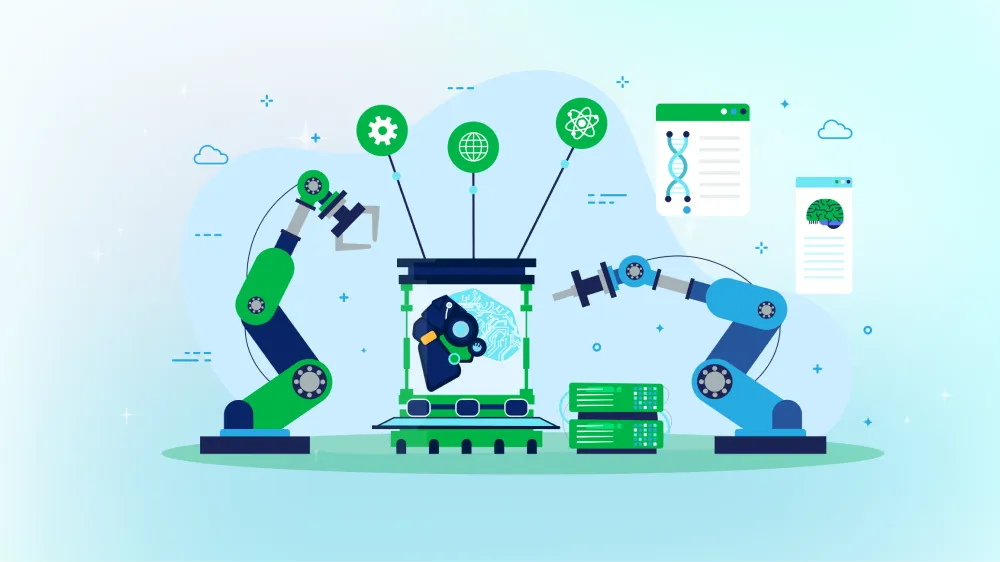
Large healthcare entities nowadays use numerous applications throughout their process. While these solutions may still function as standalone, they face challenges when working together. Therefore, organizations are shifting to automation to link all these applications and systems together, boosting efficiency and data consistency throughout every entity involved in the care workflow.
Moreover, investments in AI are growing by leaps and bounds, but the return on those investments is negligible. The key challenge is bringing AI models from the research lab to reality. Organizations are now seeing automation as the solution to this hurdle. Automated workflows bring AI models to the forefront, while automation abilities like drag-and-drop model insertion or continuous improvement can help simplify AI deployment. As automation’s AI success grows, AI and automation teams are teaming up to speed up this deployment model.
We don’t need to worry about killer cyborgs just yet. However, robotics, vision systems, and artificial intelligence are being rolled out to address workforce challenges, boost productivity, connect healthcare facilities, generate deeper insights, and improve patient care.
In the future, as the healthcare industry continues to deal with increasing demands and evolving challenges, the advantages of automation in healthcare will only gain more traction and value. As infrastructure, budget, and human resources become increasingly limited, healthcare leaders will see digitization and automation as the way forward.
Get Your Business Ready for Automation with KMS Healthcare
The healthcare industry is undergoing an extended shift influenced by various forces, including technology advancements, national and state regulatory changes, and consumer-centric trends. Using automation in healthcare can help you adapt to these changes and do the greatest good. Using tools that are smarter, faster, and more effective has advantages. Understanding the advantages and disadvantages is mission-critical for industry leaders.
Consider the expert healthcare technology teams at KMS Healthcare to plan, develop, test, and launch automation-driven products. With 15+ years of experience in healthtech, we help you achieve complete digital transformation, accelerate your team performance, and take your organization onto the automation highway.

Look at long-term solutions to problems. Business executives should stop viewing automation as an operational activity and instead view it as a holistic organizational approach. Contact us now for a scalable automation strategy that fits your business needs.

Reference
(n.d.). Making healthcare more affordable through scalable automation. McKinsey. https://www.mckinsey.com/capabilities/operations/our-insights/making-healthcare-more-affordable-through-scalable-automation
(n.d.). A guide to accelerating automation and creating scale. Deloitte. https://www2.deloitte.com/content/dam/Deloitte/us/Documents/finance/guide-to-accelerating-automation-and-creating-scale.pdf
(n.d.). AI-Driven Automation in Healthcare. Infosys. https://www.infosys.com/industries/healthcare/industry-offerings/Documents/ai-driven-automation.pdf